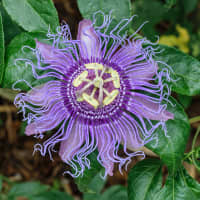Passiflora incarnata is also known as maypop, purple passionflower, true passionflower, wild apricot, and wild passion vine.
Healing Properties
- Analgesic:
- Anticonvulsant: hydroalcoholic extract of P. incarnata at a dose of 0.4 mg/kg not only prolonged the onset time of seizure but also decreased the duration of seizure as compared to the saline group.[1]
- hydro-ethanolic extract of P. incarnata suppressed seizures induced by the drug, pentylenetetrazole. The extract also ameliorated the postictal depression associated with the convulsant drug.[1:1]
- Anxiolytic: The hydroalcoholic extract demonstrated antianxiety effects.[1:2]
- Hypnotic:
- Sedative: aqueous extract demonstrated sedative effects.[1:5]
- Vermicidal:
Disease / Symptom Treatment
- Dysmenorrhoea: has been used to treat painful menstruation, typically involving abdominal cramps.
- Neurological Disorders:
- Anxiety: The benzoflavone moiety derived from the methanolic extract of P. incarnata dem- onstrated significant antianxiety activity.[1:6]
- Epilepsy:
- Hysteria:
- Insomnia:
- Mania:
- Neurasthenia:
- Opioid/Opiates Withdrawl: The methanolic extract of P. incarnata has been shown to delay the development of a tolerance to the analgesia of the opium alkaloid, morphine.[1:9]
- A single dose of methanolic extract of P. incarnata resulted in a decrease of naloxone-precipitated withdrawal symptoms in mice which have been made tolerant with chronic administration of morphine.[1:10]
- Passiflora included with clonidine treatment for opioid withdrawl showed distinctly superior improvements of mental symptoms.[1:11]
Title: Pharmacotherapeutic Potential of Natural Products in Neurological Disorders
Author(s): Amritpal Singh SaroyaJaswinder Singh
Institution(s): Herbal Consultant Mohali India; Department of Pharmacology Sri Guru Ram Das Institute of Medical Science Amritsar India
Publication: Springer Nature Singapore
Date: 20 June 2018
Introduction: Natural Products have always played a pivotal role as sources for drug lead compounds. This book is aimed at providing inside purview of the scope of natural products (including herbal and marine) in the possible treatment of neurological disorders. The book explains pre-clinical neuropharmacological investigations done on herbs including Bacopa monnieri, Hypericum perforatum, Passiflora incarnata, Scutellaria baicalensis and Piper methysticum. It provides a comprehensive overview of the role of phytoconstituents like huperzine, curcumin, Salvinorin A, bioflavonoids, sulforaphane, tanshinone IIA, tetramethylpyrazine, tetrahydrocannabinol, and cannabidiol in the treatment of neurological disorders. The book provides a modern concept of herbal medications, neuropharmacology of marine bioactive products and Ayurvedic formulations, herbal drugs with abuse potential and neurotoxic mycotoxins.
Link: Source
Citations: ↩︎ ↩︎ ↩︎ ↩︎ ↩︎ ↩︎ ↩︎ ↩︎ ↩︎ ↩︎ ↩︎ ↩︎
